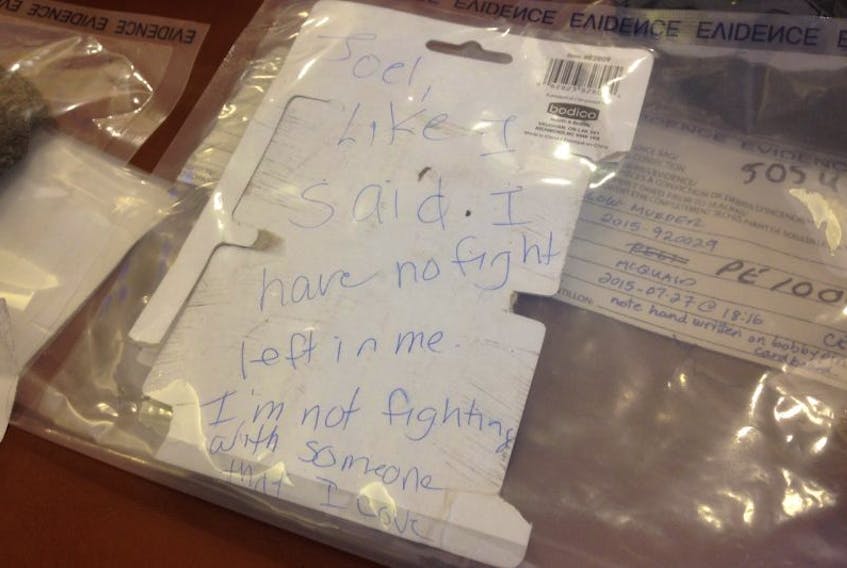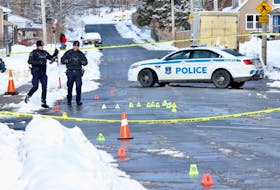A judge will now decide if the man she was closest to during the final days of her life had the intent to end that life.
Lynch died some time between 12 a.m. and 2:30 a.m. on July 24, 2015 from what a forensic pathologist determined was strangulation and a blunt head injury.
Related: Defence rests after psychiatrist testifies about Clow’s mental state

It happened near her home in Pleasant Grove, P.E.I., a rural community located 16 kilometres north east of Charlottetown.
The autopsy found she was badly beaten with injuries to her head, face, neck, back, torso and extremities.
On May 15, Clow’s first-degree murder trial by judge alone began before P.E.I. Supreme Court Justice Nancy Key in Charlottetown.
A statement of admissions entered into evidence that day included Clow, who was in a relationship with Lynch, acknowledging his physical acts must be responsible for her death.
Throughout the trial more details emerged about what happened to Lynch on the day she died.
Some of those details came from Clow’s statement to police, which lasted almost two hours at an RCMP detachment in eastern P.E.I.
The whole video statement was played in court.

During that interview, Clow could be seen fidgeting in his chair with a blanket covering his legs as he complained he was going through withdrawal.
At times Clow covered his face with his hands and twice burst into tears as he told police much of what happened was a blank.
It was in that interview Clow told police he didn’t intend to kill Lynch after the two had been arguing because he thought she had been across the road at a neighbour’s house.
Clow said Lynch denied the allegation.
That neighbouring house was where two men found blood, hair, broken patio furniture and drag marks in the grass.
An RCMP dog handler and his dog Cash found Lynch’s body after following a scent from the neighbouring yard to Clow’s property and a wheelbarrow hidden under a tarp.

No part of Lynch’s naked body was visible in the wheelbarrow until the handler lifted part of the tarp where she was surrounded by dirty fish tubs and other debris behind a stack of lobster traps.
Investigators had to peel away layers that included a plastic fish tub lid, a ratty tarp, a blanket, a rain slicker, a seat cushion and a torn, stretched T-shirt that was tied in three knots.
By the next night the police had Clow in custody after finding him curled up in a ball under a pile of blankets in his mini-home.
Throughout the trial the court heard evidence Clow and Lynch used drugs with the accused telling police he took 15 speed pills a day for several months, drank and used cocaine.
Several witnesses testified Lynch told them she was scared of Clow and they recounted stories she told about Clow’s treatment of her, including putting all of her clothes in a bathtub and pouring bleach on them.
Another witness recounted seeing scratches on Lynch’s legs that the victim said were from running through the woods to get away from Clow who tried to run her down.
It was through all the evidence heard at trial that the Crown had to establish Clow killed Lynch while committing forcible confinement and that he had the required intent.
Defence lawyer Joel Pink called two witnesses in the case with both giving expert opinions on what they thought Clow’s state of mind would have been the day Lynch died.
Analysis of a sample of Clow’s blood taken after his arrest found alcohol, methamphetamine, THC and THC metabolites, a cocaine metabolite and a sedative.
The metabolites indicated Clow had consumed the related drugs at some point.
A toxicology expert the defence called testified it was his opinion Clow could have been experiencing a drug-induced psychotic state at the time of Lynch’s death.
On the final day of the trial, a forensic psychiatrist said Clow would have been “grossly intoxicated” due to the consumption of alcohol, methamphetamine and cocaine.
It was likely Clow was unable to form the specific intent to commit murder, the psychiatrist said.
Crown attorney Cyndria Wedge tried to poke holes in that conclusion by pointing out inconsistencies in the versions of events Clow recounted to several people.
With the defence calling its final witness Friday and the lawyers for both sides presenting written submissions, Key adjourned the case until July 21 for her decision.
A mother ended up dead and abandoned under a pile of trash.
Everybody now knows who put her there. That is not in question.
The judge will now have to decide the motivation behind Traci Lynch’s sad and sickening end.
[email protected]
twitter.com/ryanrross
TIMELINE:
Traci Lynch’s death
July 23, 2015
10:30 p.m. – Joel Clow and Traci Lynch buy alcohol at a convenience store in Charlottetown.
July 24, 2015
12 a.m.-2:30 a.m. – Traci Lynch dies of strangulation and blunt head injury.
July 25, 2015
1:18 a.m. – RCMP officers arrest Clow at the Queen Elizabeth Hospital in Charlottetown.
July 25, 2015
5:55 p.m. – Clow starts statement to police during which he says he didn’t intend to kill Lynch.









